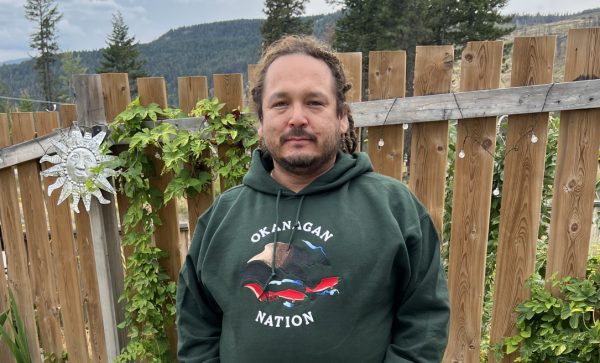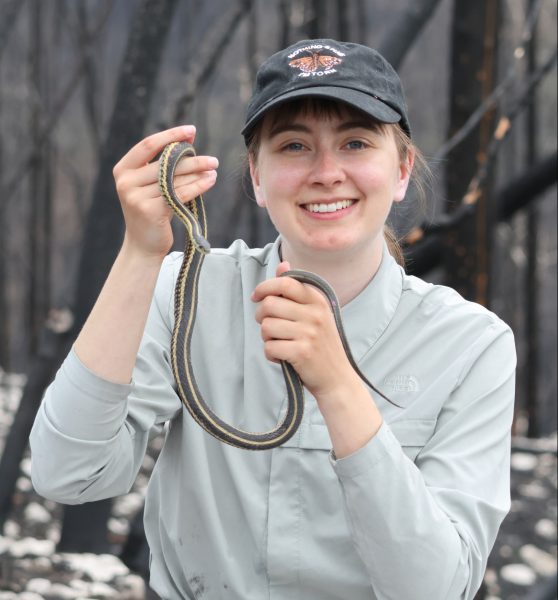In a remarkable boost to their academic futures, 24 graduate students from Thompson Rivers University (TRU), including six Indigenous scholars, have collectively been awarded over $500,000 in scholarship funding.
This significant financial support, provided through the BC Graduate Scholarship program and the Canada Graduate Research Scholarship – Master’s (CGS-M) program, serves as a catalyst for enhancing student research opportunities and academic success at TRU.
“These awards represent an investment in the future of graduate education at TRU, highlighting the university’s commitment to advancing student research,” says Sukh Heer Matonovich, director of Student Research and Graduate Studies. “By empowering emerging scholars, TRU is reinforcing its role as a leader in academic excellence and discovery.”
Advocating for change
TRU Master of Arts in Human Rights and Social Justice student Joseph Kruger, a member of the Syilx Okanagan Nation in Penticton, B.C., emphasizes the significance of receiving $27,000 in CGS-M funding, supplemented by an additional $5,000 for Indigenous students, from the Social Sciences and Humanities Research Council (SSHRC).
“The financial support significantly reduces stress,” he says. “It helps me balance my academic responsibilities with my personal life while encouraging me to move forward in my education and research. Additionally, the award has allowed me to significantly increase my book-buying budget, enabling me to purchase essential books for my studies.”

Master of Arts in Human Rights and Social Justice student Joseph Kruger
This support follows a challenging period for Kruger and his family. In 2021, they lost their home in Vernon, on the Okanagan Indian Band reserve, to the White Rock Lake fire.
“The years following that have been difficult, mostly focused on recovery and rebuilding,” he says.
Despite these setbacks, Kruger continues his studies, commuting daily from Vernon to Kamloops for classes on campus. He is also a father to a one-year-old and a veteran of the Canadian Armed Forces.
“I’m juggling a lot, but I’m committed to spotlighting the issues Indigenous people face,” he says.
Kruger’s research explores the systemic barriers faced by Indigenous people, where their lived experiences and cultural knowledge often go unrecognized or undervalued, especially within the justice system. He examines how different aspects of a person’s identity intersect to create epistemic and testimonial injustice, such as how a person’s Indigeneity and queer identity could discredit them in court or silence their testimony. His thesis is extensively informed by his personal insights and firsthand observations and experiences. Through his work, he aims to highlight the injustices confronting Indigenous communities.
Kruger recently completed a practicum with the Okanagan Nation Alliance, engaging in work that closely aligns with his academic and community interests. He is preparing to focus on his thesis this fall.
“I want to contribute to the discourse surrounding Indigenous rights, raising awareness, identifying critical issues and expanding the existing body of knowledge,” he says.
Through his research, Kruger hopes to be a catalyst for change and advocate for a more equitable and inclusive society.
Fostering northern research
TRU Master of Science in Environmental Science student Johanna Stewart was delighted after recently receiving $27,000 in CGS-M funding from the Natural Sciences and Engineering Research Council (NSERC). This funding allows her to conduct research, including surveys, laboratory analysis and hiring field assistants to support fieldwork, without needing a job during the academic year.

Master of Science in Environmental Science student Johanna Stewart
“It makes a huge difference,” she says.
Under the supervision of science faculty member Dr. Karl Larsen, Stewart is researching red-sided garter snake populations in Fort Smith, Northwest Territories. These populations were impacted by the 2023 wildfire season, which was Canada’s worst on record, according to the Canadian Climate Institute. Her research aims to update baseline data on the snake population, assess the impact of wildfires and inform conservation efforts.
Stewart’s research builds on work conducted by Larsen decades ago when he performed master’s research on the same snake population in the region.
“Back then, his research provided the first intensive look at this garter snake population,” she says.
The snakes’ habitat, including their hibernacula (dens critical for their survival particularly in the far North where they are essential for overwintering), was largely within the burn perimeter of the 2023 fire season.
“There was a question about the impact on these snake populations, and the Government of the Northwest Territories reached out to an expert on this snake population, and that was Karl Larsen,” she says.
Discussions with these organizations highlighted the need for research to explore the wildfire’s impact on red-sided garter snakes. A former colleague from the Government of the Northwest Territories contacted Stewart to lead the project as a master’s student, to which she quickly agreed.
Stewart is passionate about highlighting “underappreciated” wildlife and unique ecosystems, emphasizing their distinctiveness and the need for attention and resources.
“I’m particularly grateful that NSERC, TRU and other organizations are supporting more research in the North, which is my home — a place filled with wonderful, unique, important and beautiful people, creatures, plants and landscapes,” she says.
“I feel so much gratitude and a great responsibility to contribute to my community, hoping that my research is used in a meaningful way to protect and conserve our very special wildlife and plant life here in the North.”
Advancing women’s health

Master of Nursing student Audra Kozun with her family
Audra Kozun, a TRU Master of Nursing student, labour and delivery nurse at Victoria General Hospital in Victoria, B.C. and mother of two children aged six and eight, says receiving $17,500 in BC Graduate Scholarship funding has enabled her to build a career she’s proud of, free from financial distractions.
“It helped me in my research and has made things easier by not having to worry about bills,” says Kozun, who will soon graduate from TRU with her master’s degree. She is set to begin the Master of Nursing Nurse Practitioner program in the fall.
Her research on perinatal care in Victoria highlights the impact of the pandemic on primary care provider availability, the resulting inequities in health care and explores potential solutions to address the shortage.
“After the pandemic, we noticed there simply weren’t enough doctors and midwives to care for our patients, which was confusing,” she explains. “People were showing up to have their babies without any prenatal care, which is terrifying.”
Kozun found the number of doctors offering obstetric care fell from 53 to 23, not accounting for practicing midwives, resulting in significant challenges in prenatal care.
Her study involved qualitative interviews with five doctors and five midwives in her local area.
“The research examines what occurred pre-pandemic to set the stage for the downfall, what happened intra-pandemic that made the situation more difficult, the solutions that were initiated, and post-pandemic, how the doctors and midwives envision the future of perinatal stabilization. It also considers other core measures they’re interested in incorporating.”
She hopes her research will increase awareness of perinatal health and inspire further research. Additionally, she wants policy reforms to support perinatal health and address systemic issues.
“Perinatal health, obstetrics and women’s health are critical” she says. “We need to raise public awareness of how these issues affect people and families long-term. This is serious. It can mean life or death for a baby or a mother. The providers I interviewed agree that more avenues and different care models are necessary to cover more people. It’s erroneous to think there’s a one-size-fits-all approach to health care in general, and obstetrics is no exception.”

